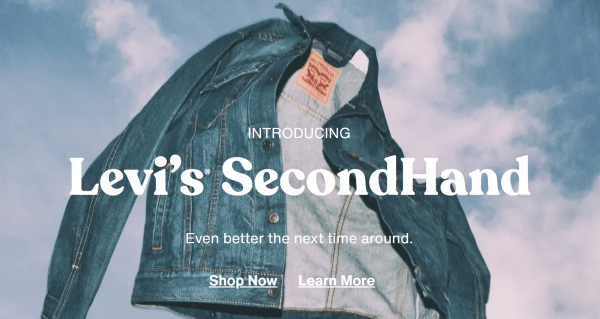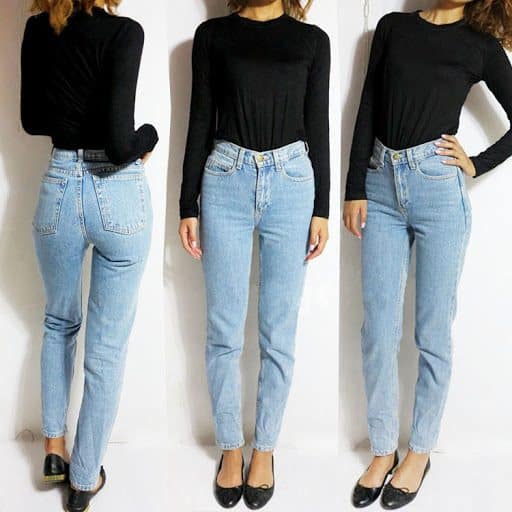Levi’s announced a new program — Levi’s SecondHand — through which they will buy your used Levi’s, clean them, and offer them for resale.
They will do this with an outfit called Trove which touts its efforts as Raa$ — Re-commerce as a service. Very clever.
This effort is a newly named effort called “Re-Commerce” or “circular shopping.”
Levi’s SecondHand <<< link
Here is the program:
1. You, the consumer, buy a pair of Levi’s jeans.
2. You wear your new jeans. You live in them. You love them.
3. For whatever reason, you consider your jeans to be surplus — maybe you lost weight and need a slimmer pair (I did not suggest you had GAINED weight, because I am just that kind of Big Red Car).
4. You pop on over to a Levi’s store and give them your jeans. [Reluctantly, perhaps, maybe some great things happened in those jeans, but those memories stay with you. Only the jeans move on to a new owner.]
5. Levi’s gives you a gift card in the amount of the “value” of your jeans. Big point — store credit, not cash.
This is very close to a virtual currency Levi’s is creating. There will be enormous float and breakage with this type of store credit.
6. You use your Levi’s gift card — store credit — to buy more jeans thereby starting the cycle of jeans ownership yet again.
7. Levi’s cleans and remarkets your jeans (in partnership with Trove) with the efficiency of a website and other nifty marketing ideas thereby beginning the cycle again with a new owner.
Why, Big Red Car?
Well, the why is interesting.
1. Jeans are a hot commodity in the used and vintage clothing space. Not a surprise, right?
Levi’s is looking to leverage their customer base and their product knowledge to serve the additional demand of their own customers — simple marketing logic.
Example of product knowledge? Size charts have changed over the years and Levi’s can translate a Size 30 from 1984 into a current size.
2. Levi’s sees this as an effort to control the entire life cycle of their product, brand.
New car dealers sell used cars because in the course of selling a new car they may take a used car as a trade-in. Similar, no?
3. Recycling, vintage clothing, used clothing, thrift, second hand clothing, re-commerce, circular shopping are all growing and are fueled by recycling initiatives, concern with the amount of energy that is trapped in landfills when goods are abandoned, and other environmental concerns.
This is a new consumer behavior that is going to be a force in commerce. It has a name: the Resale Market.
4. The labor and energy in a product is trapped and if abandoned to waste is lost forever.
5. Some 60% of Gen Z is buying in the Resale Market.
How woke is this, Big Red Car?
Being “woke” is part practical reality, part actual virtue, part faux virtue, and part style. SecondHand by Levi’s hits all of those notes. Let’s explore:
1. The Resale Market is woke. It is hip, chic, and woke.
2. The trapped energy, reduced carbon footprint thing is real and woke. This is genuine virtue turned loose with a full dose of woke.
3. Getting volumes of clothing out of landfills is always woke. Again, genuine virtue clothed in a full wrap of woke.
4. The creation of a virtual Levi’s currency — store credit — is a little woke, but every little bit helps.
5. The use of tech in reCommerce is woke.
Bottom line it, Big Red Car, we have someplace to go
OK, here it is y’all: the Resale Market is here, big companies like Levi’s are in it, companies like Trove are providing services and support that make it easy for any company to get in the swim.
Jeans — Levi’s jeans — are iconic and last forever, so the reCommerce angle makes sense for them.
This controls the brand life cycle of a piece of denim with the Levi’s brand on it. Well played.
This — Levi’s Secondhand — is a real deal. Expect to see a lot more of this.
But, hey, what the Hell do I really know anyway? I’m just a Big Red Car in a pair of special made Levi’s 501s. Be good. Be brave. Be the change you want to see.


